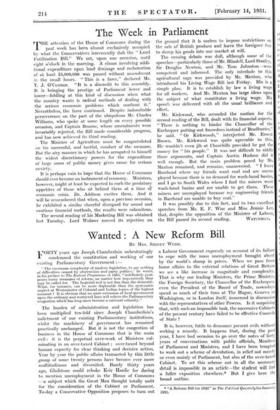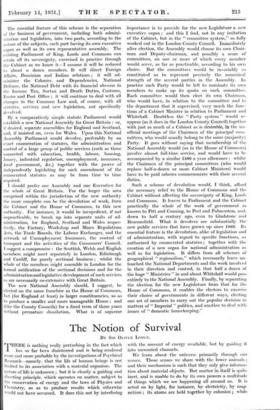Wanted : A New Reform Bill
BY MRS. SIDNEY WEBB.
FORTY years ago Joseph Chamberlain unhesitatingly condemned the constitution and working of our existing Parliamentary Government :- " The enormous complexity of modern legislation, to say nothing of difficulties caused by obstruction and party politics," he wrote, in his prefaco to The Radical Programme of 1885, "indefinitely post- pones many measures of reform, no matter how imperatively they may be called for. The Imperial evil is not less than the domestic. What, for instance, can be more deplorable than the systematic neglect at Westminster of Colonial and Indian topics of the highest moment ? It is obvious that no mere extension of local government upon the ordinary and restricted lines will relieve the Parliamentary congestion which has long since become a national calamity."
The burden of administration and legislation has been multiplied ten-fold since Joseph Chamberlain's indictment of our existing Parliamentary institutions, whilst the machinery of government has remained practically unchanged. But it is not the congestion of business in the House of Commons that is the main evil : it is the perpetual over-work of Ministers cul- minating in an over-taxed Cabinet ; over-taxed beyond human capacity for clear thinking and decisive action. Year by year the public affairs transacted by this little group of some twenty persons have become ever more multitudinous and diversified. Barely thirty years ago, Gladstone could rebuke Keir Hardie for daring to mention unemployment in the House of Commons —a subject which the Great Man thought totally unfit for the consideration of the Cabinet or Parliament. To-day a Conservative Opposition proposes to turn out a Labour Government expressly on account of its failure to cope with the mass unemployment brought about by the world's slump in prices. When we pass from home affairs to the external relations of Great Britain we see a like increase in magnitude and complexity. That is why our leading Ministers, the Prime Minister, the Foreign Secretary, the Chancellor of the Exchequer: even the President of the Board of Trade, nowadays spend. so much of their time at The Hague, Geneva or Washington, or in London itself, immersed in discussion with the representatives of other Powers. Is it surprising that, with such an impossible task, the successive Cabinets of the present century have failed to be effective Councils of State ?
It is, however, futile to denounce present evils without seeking a remedy. It happens that, during the past year, I have had occasion to go over the notes of forty years of conversations with public officials, Members of Parliament and Ministers, and I have been tempted to work out a scheme of devolution, in relief not merely or even mainly of Parliament, but also of the over-taxed Cabinet. To set this scheme out in all the necessary detail is impossible in an article—the student will find a fuller exposition elsewhere.* But I give here the broad outline.
* "A Reform Bill for 1932" in The Political Quarterly, forJanuaty, 1931. The essential feature of this scheme is the sepiration of the business of government, including both admini- stration and legislation, into two parts, according to the nature of the subjects, each part having its own executive organ as well as its own representative assembly. The existing Parliament of King, Lords and Commons can retain all its sovereignty, exercised in practice through the Cabinet as we know it—I assume it will be reduced to about a dozen members. It will direct Foreign Affairs, Dominion and Indian relations ; it will ad- minister the Colonies and Dependencies, National Defence, the National Debt with its financial obverse in the Income Tax, Surtax and Death Duties, Customs, Excise and Post Office ; it will continue to deal with all changes in the Common Law and, of course, with all statutes, services and new legislation, not specifically devolved.
By a comparatively simple statute Parliament would establish a new National Assembly for Great Britain : or, if desired, separate assemblies for England and Scotland, and, if insisted on, even for Wales. Upon this National Assembly Parliament would devolve, preferably by an exact enumeration of statutes, the adminiitration and control of a large group of public services (such as those connected with education, health, labour, housing, lunacy, industrial regulation, unemployment, insurance, local government, &c.) together with the power of independently legislating for such amendment of the enumerated statutes as may be from time to time required.
I should prefer one Assembly and one Executive for the whole of Great Britain. For the larger the area comprised within the jurisdiction of the new authority the more complete can be the devolution of work, from the Cabinet and the House of Commons, to this new authority. For instance, it would be inexpedient, if not impracticable, to break up into separate units of ad- ministration, for England, Scotland and Wales respec- tively, the Factory, Workshop and Mines Regulations Acts, the Trade Boards, the Labour Exchanges, and the network of Unemployment Insurance, the control of transport and the activities of the Consumers' Council. I suggest a compromise : the Scottish, Welsh and English members might meet separately in London, Edinburgh and Cardiff, for purely sectional business ; whilst the whole of the members might assemble in London for the formal ratification of the sectional decisions and for the administration and legislative development of such services as are necessarily co-extensive with Great Britain.
The new National Assembly should, I suggest, be elected on the same franchise as the House of Commons, but (for England- at least) in larger constituencies, so as to produce a smaller and more manageable House ; and (like the County Councils) for a fixed term of three years Without premature dissolution. What is of supreme importance is to provide for the new Legislature a new executive organ ; and this I find, not in any imitation of the Cabinet, but in the " committee system," so fully worked out in the London County Council. Immediately after election, the Assembly would choose its own Chair- man and Deputy-chairman, and possibly a score of committees, on one or more of which every member would serve, as far as practicable, according to his own choice. But the committees would be invariably so constituted as to represent precisely the numerical strength of the several parties in the Assembly. In practice each Party would be left to nominate its own members to make up its quota on each committee. Each committee would then elect its own Chairman, who would have, in relation to the committee and to the department that it supervised, very much the func- tions of a Cabinet Minister in relation to Parliament and Whitehall. Doubtless the " Party system " would re- appear (as it does in the London County Council) together with just as much of a Cabinet as is desirable, in the un- official meetings of the Chairmen of the principal com- mittees, who would usually belong to the same (majority) Party. It goes without saying that membership of the National Assembly would (as in the House of Commons) involve almost full-time service, and would have to be accompanied by a similar £400 a year allowance ; whilst the Chairmen of the principal committees (who would replace half-a-dozen or more Cabinet Ministers) would have to be paid salaries commensurate with their several duties.
Such a scheme of devolution would, I think, afford the necessary relief to the House of Commons and the Cabinet without affecting the sovereignty of King, Lords and. Commons. It leaves to Parliament and the Cabinet practically the whole of the work of government as known to Pitt and Canning, to Peel and Palmerston, and, down to half a century ago, even to Gladstone and Beaconsfield. What it devolves are substantially the new public services that have grown up since 1880. Its essential feature is the devolution, alike of legislation and of administration, with regard to specific functions, as authorized by enumerated statutes ; together with the creation of a new organ for national administration as well as for legislation. It differs from all schemes of geographical " regionalism," which necessarily leave un- touched the National Departments and the work involved in their direction and control, in that half a dozen of the huge " Ministries " in and about Whitehall would pass entirely to the National Assembly. Finally, by separating the election for the new Legislature from that for the House of Commons, it enables the electors to exercise their choice of governments in different ways, electing one set of members to carry out the popular decision in matters of " Imperial " politics, and another to deal with issues of " domestic housekeeping."
















































 Previous page
Previous page